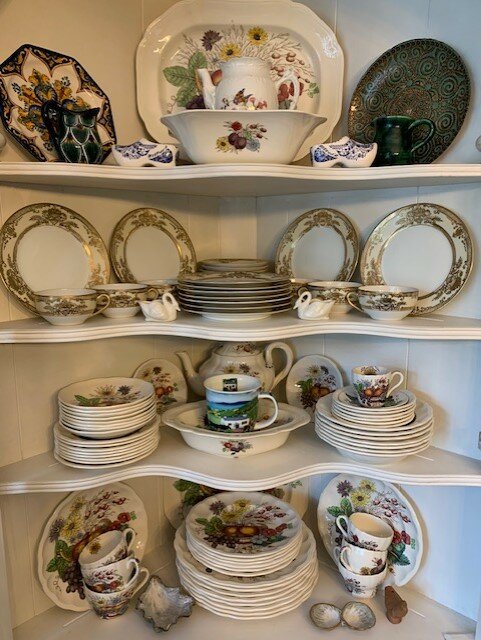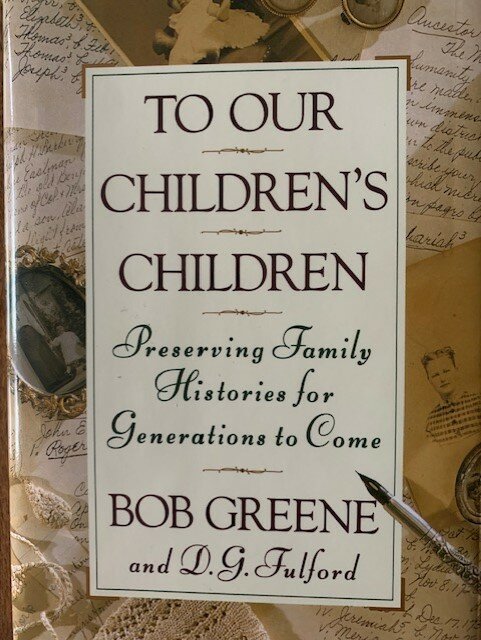- TUESDAY, JULY 16, 2024
Instead of ‘stuff,’ consider leaving a legacy project
Baby boomers were gifted the silver, china, crystal, and linens that their parents saved for and treasured, but now many millennials are minimalists and less interested in family heirlooms. If the …
This item is available in full to subscribers.
Please log in to continue |
Register to post eventsIf you'd like to post an event to our calendar, you can create a free account by clicking here. Note that free accounts do not have access to our subscriber-only content. |
Day pass subscribers
Are you a day pass subscriber who needs to log in? Click here to continue.
Instead of ‘stuff,’ consider leaving a legacy project

Bill was in his nineties and for Christmas his granddaughter gave him the gift of Storyworth. Each week Storyworth emailed him questions to help prompt life reflection and stories he might share. These would eventually be compiled into a keepsake book.
Bill had some computer skills, and he began to structure his day around documenting his memories. The process gave him purpose, and when asked to take a break or join the family for dinner, he would often respond with “wait a minute.”
For over a year, he wrote about his childhood, the hurricane of ’38, World War II, his marriage, and “the simpler parts of life, because it was not about the material things”, said his daughter Jan. He lived to see it bound and was extremely proud to share copies with his family. The book is now “a testament to who he was” shared Jan. It sits on her shelf, and she is comforted to know that she and her children will have it forever. https://welcome.storyworth.com/homepage
Baby boomers were gifted the silver, china, crystal, and linens that their parents saved for and treasured, but now many millennials are minimalists and less interested in family heirlooms. If the items collected by parents and grandparents have less appeal, what does this mean to family history and lasting memories? Gone AND forgotten?
Consider leaving a different kind of legacy for future generations through the sharing of stories and creating personal and meaningful projects.
The reality of ‘stuff’
Current home design and lifestyles are more casual, and china that should not be put in a dishwasher or silver that needs polishing are not on today’s bridal registries. It took years for my mother-in-law to afford her set of dishes, hand-picking each plate to ensure the colors of the grapes were consistent. I cherish them but suspect my sons will not be vying for Nana’s dishes, nor will they have a china cabinet in which to put them. The idea that “my stuff will be your stuff someday” is increasingly wishful and misguided.
The author Roz Chast described cleaning out her parents’ crammed Brooklyn apartment as “massive, deeply weird, and heartbreaking” and started to look at her own stuff a little “postmortemistically”. There is an expression in Sweden called döstädning that literally means “death cleaning,” or slowly decluttering your house so that your family is saved from this exhausting and emotional burden.
Margareta Magnussen coined the term in her 2017 book, “The Gentle Art of Swedish Death Cleaning: How to Free Yourself and Your Family from a Lifetime of Clutter.” Her advice: “If the item is not useful or considered beautiful, it can go.”
Living in an environment with fewer accumulations can simplify life and have a positive impact on well-being. Moving often forces a person to edit their possessions, but it can be a lifelong habit or a new habit to consider. Professional organizers recommend taking 10 minutes a day and going room by room to get started.
Legacy projects
Legacies can come in many forms beyond money or property and can include sharing one’s ethics, faith, or documenting key events and activities. Reflections on lessons learned, hopes and dreams could be invaluable to the next generation. Compiling treasured recipes or organizing a lifetime of letters and journals can help make them more meaningful. Writing letters to family members to be read posthumously or read on specific occasions, such as a wedding day, can speak to what really mattered to an individual and reflect important family traditions.
These are just some examples of “ethical” wills and represent legacy projects that focus on sharing one’s heartfelt wisdom and personal perspectives. Pivotal experiences, moral philosophies, family values and religious beliefs, are just some of the potential topics. There are websites with templates to guide you along the way: https://www.everplans.com/articles/ethical-will-worksheet.
These projects could be started at any time and reviewed and revised over time or written in a day. Some websites will create an ethical will on video, DVD or a digital scrapbook. https://www.myfarewelling.com/article/companies-to-help-preserve-memories-and-messages
However, there is no need for a computer. If pen and paper are preferred, Bob Greene’s book, “To Our Children’s Children,” includes more than 20 categories with questions to trigger memories and thoughts. In the book, “So Grows the Tree – Creating an Ethical Will: The legacy of your beliefs and values, life lessons and hopes for the future,” author Jo Kline Cebuhar outlines a simple step by step approach.
Not everyone is a writer, and there are countless alternatives for leaving a lasting memory for those who come after us. A piece of art, quilting or needlepoint created by a family member might communicate more than words ever could. Treasured recipes can be printed on tea towels https://theprintedgift.com/ , photos can be duplicated on blankets, and hand-crafted items can be labelled for safe keeping. Maybe there is a project that was put aside due to an illness or death and never finished. The organization Loose Ends Project (https://www.looseendsproject.org/) will match handwork crafters from around the world with a family that has an uncompleted handmade item. The connection is made, and when the item is finished, it is returned to be cherished.
Dena Kourametis wrote about the psychology behind what each generation considers important in Psychology Today. Rather than taking the lack of interest in inheriting our belongings personally, she states, “I regularly contribute chapters to my own life memoir … so that my daughter and any future generations might know something about me they might never have been otherwise privy to. It is my gift to her. Somehow, I know that is more valuable than a crystal goblet.” (https://www.psychologytoday.com/us/blog/raging-grace/202101/why-many-adult-children-just-dont-want-their-parents-stuff)
The process of creating a legacy project can also have its own rewards. It should be simple and fun and feel like the labor of love that it is. It might encourage engagement and collaboration with other family members to complete. For some, looking back on life events and accomplishments can help bring a sense of closure. Having the time and opportunity to share gratitude, forgiveness, and blessings for the future is not a given and can be a beautiful way to leave a hand-me-down worth keeping.
Bonnie Evans, RN, MS, GNP-BC, lives in Bristol and is a geriatric nurse practitioner and End of Life Doula. She can be reached at bonnie@bonnieevansdoula.com.
Other items that may interest you









